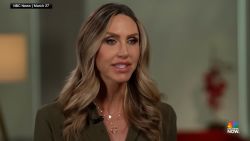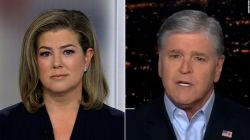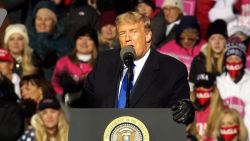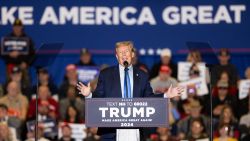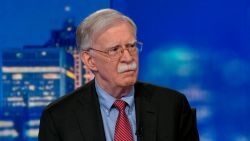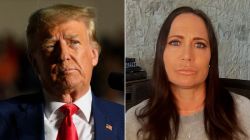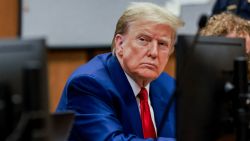President Donald Trump says the country is doing great in a pandemic that just infected its four millionth US victim and is killing 1,000 people a day. But his claim is based on a brazen confidence trick, requiring Americans to ignore his responsibility for the spike in the southern and western states as he claims credit for the success of northeastern states that suppressed the disease after not heeding his advice to reopen before the virus was under control.
And that might not even be the most outrageous thing the President said at his third briefing in as many days.
The President, after months mocking mask wearing and social distancing guidelines, trawled for credit and claimed he was setting an “example” after deciding to cancel Republican convention events in Covid-battered Florida.
Though deeming the situation too dangerous to hold the quadrennial political showpiece, he nevertheless insisted that it was perfectly safe for children to go back to school full time in a few weeks.
Trump used northeastern states like New York, New Jersey and Connecticut, which lowered their infection curve with strict stay-at-home orders, as part of a misleading argument that much of the US was free of the virus. What he didn’t say is that those states succeeded because they ignored his calls to reopen.
View Trump and Biden head-to-head polling
“That’s really very much indicating where the problems are,” Trump said, referencing a map showing less virus penetration in the Northeast and central plains states, where fewer people live, than across the sunbelt.
“You see from that – it’s in great shape, lots of it,” Trump said.
“The Northeast has become very clean. The country is in very good shape other than if you look south and west, some problems that’ll all work out,” the President said.
States that disregarded scientific advice to satisfy government benchmarks on reopening, many led by pro-Trump governors and that backed him in 2016 – like Texas, Florida and Arizona – are now in the middle of a Covid-19 nightmare. Florida, for example, registered 10,249 new cases and 173 additional deaths on Thursday, breaking the previous record of 156 deaths on July 16, according to the state’s department of health.
Trump also complained that a dozen European countries and Taiwan and South Korea were sending their kids back to class and America wasn’t, ignoring the fact that those places had competent central governments that beat back the virus properly. Trump, however, failed to provide the leadership and nationwide testing and tracing system that might make a resumption of school a viable proposition along with a full reopening of the economy. The United States currently has more infections and deaths than any other nation.
“This isn’t about politics, this is about something very, very important. This is not about politics,” Trump said about his return-to-school push, after months in which politics and not science appeared to be the primary driver of his response to the worst domestic crisis since World War II.
Still, if Thursday’s erratic half-hour briefing did not provide medical clarity, it did offer some insight into the President’s electoral thinking. His decision on his convention acceptance speech — that he had previously demanded should go ahead and had moved from North Carolina after officials said it was not safe – made one thing clear: he finally understands that his denial and neglect of the pandemic gravely threaten his reelection.
Trump hero worships Yankees closer on tragic day
It is also becoming obvious that Trump’s return to the White House briefing room has nothing to do with a genuine new “tone” or providing solid information to the American people. (Following complaints that he was not sharing the stage with medical experts, top coronavirus task force member Dr. Deborah Birx sat to one side on Thursday, wearing a mask, but was not called upon to speak.)
Several times in an appearance that took place as deaths raced towards the 1,000 mark for another day, Trump paused to hero worship former New York Yankees pitcher Mariano Rivera, who sat in staff seats adjacent to the President and was not wearing a mask.
Trump responded to a question about whether the canceled Jacksonville event showed that he was pushing openings too fast by announcing he would throw out the opening pitch at a Yankees game in August.
“I’ve never seen a pitcher throw a ball where so many bats were broken as Mariano. He’s got the all-time record,” Trump added in remarks that showed the lack of focus and seriousness behind his leadership in the pandemic.
The briefings have turned into a theater of disinformation in which the President hypes any positive development – like progress on vaccines – yet ignores the terrible and rising human toll of the pandemic and offers highly misleading information about its seriousness and likely duration.
“It’s going to come and go. It will. When you look at what happened in New York and what happened in New Jersey and other places. And now you’re looking and it’s gone. I hope it stays gone.”
Trump’s upbeat assessment contrasted with warnings of his own coronavirus task force members on Thursday. Dr. Anthony Fauci, using a baseball metaphor on Opening Day of the truncated Major League Baseball season, said at a briefing hosted by the TB Alliance: “We are not winning the game right now, we are not leading it.”
Birx privately told a group of state and local health officials on Wednesday about a concerning rise in coronavirus cases in 12 cities – even as Trump laid out a more scripted, optimistic message.
Trump says he canceled convention to ‘protect’ the American people
Democrats decided weeks ago that it was too inappropriate given the national emergency to hold a full nominating convention to anoint former Vice President Joe Biden as their candidate. Trump has long insisted that his moment would take place before a big crowd and and mocked his rival for planning a virtual convention. So his claim that his decision to cancel showed great leadership was a stretch.
“It’s really something that, for me, I have to protect the American people. That’s what I’ve always done, that’s what I always will do, that’s what I’m about,” Trump said, claiming that his staff counseled him that the convention could go ahead easily but that he told them he was “elected to help and protect.”
Trump’s campaign is likely to react to criticism of the entire convention saga by saying that reporters who criticized him for going ahead are now slamming him over the cancellation and that the President cannot win.
But the notion that the President all along cared most about the American people is belied by the fact that for weeks he downplayed the threat posed by the virus to the United States and then pushed states to open up prematurely before it was vanquished. Until this week, when the political damage wrought by his indifference became ever more obvious, the President all but ignored the worsening crisis.
“We have to be vigilant, we have to be careful. And we also have to set an example. I think setting the example is very important,” Trump said, in a deeply ironic remark given his previous attitude.
One source familiar with the situation told CNN Thursday that the President had been watching increasing numbers of Republican lawmakers announcing that they would not come to the convention speech in Jacksonville, which has turned into a coronavirus hotspot in recent weeks.
The prospect of a disappointing crowd at the televised event would have been deeply unpalatable to the President, who was embarrassed and ridiculed for the poor attendance at his comeback rally in Tulsa, Oklahoma, last month.
Reopening schools ‘critical’
The President also redoubled his demands for schools to open – in a move that could help revive the economy vital to his reelection and foster a sense of normalcy he needs to argue he led the country out of the fire.
He asked Congress to provide $105 billion to help schools open in a new stimulus bill currently being negotiated on Capitol Hill.
But the President also said that school districts that don’t open up should be deprived of such funding, setting up another clash with Republicans in Congress who do not agree with such steps. He said unused money would “go to the parents” to let them decide whether to send kids to private or charter schools. “We cannot indefinitely stop 50 million children from going to school,” Trump said. “Reopening our schools is also critical to ensuring parents can go to work and provide for their families.”
While he did allow that some schools in hotspot areas might need to stick with distance learning for a time, the President completely underplayed the fears of parents who are desperate for their children to get back into the classroom but who also worry they could bring the virus home. Schools are a vital lifeline for less well-off children, who rely on them for proper meals, and those who have family problems at home often first spotted by teachers.
Even so, multiple school districts and governors across the country have decided not to follow Trump’s warnings because they cannot guarantee the safety of kids in already crowded buildings or fear that mass gatherings like a normal school day will unleash new centers of infection.
Trump spoke about how children have very strong immune systems and rightly said that the incidence of kids with complications from the virus is very low.
Government health experts like Fauci and Dr. Robert Redfield, director of the US Centers for Disease Control and Prevention, have said that they do not yet know to what extent children are drivers of infection in the home.
One recent study in South Korea found that while children younger than 10 transmit the disease much less often than adults, those of middle school and high school age are as likely to spread the virus as adults.
Such data suggests that sending older children back to school could seed new centers of infection — and put teachers and ancillary staff at high risk.
But new CDC guidelines issued Thursday said that “no studies are conclusive, but the available evidence provides reason to believe that in-person schooling is in the best interest of students, particularly in the context of appropriate mitigation measures similar to those implemented at essential workplaces.”
Such is the pressure that Trump has exerted on government scientists and experts off all kinds to bolster his personal goals. The recommendations will never be free of the taint of politics.











